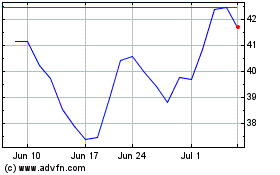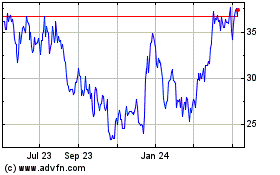Alcoa Shares Drop As Investors Worry About Tariff Impacts -- Update
July 19 2018 - 7:47PM
Dow Jones News
By Austen Hufford and Bob Tita
Shares of Alcoa Corp. fell 13% to $41.56 on Thursday after the
aluminum maker said the recently enacted U.S. tariffs are hurting
its earnings.
The Pittsburgh company, which made only about 14% of the
aluminum it produced globally last year in the U.S., relies on
imports from Canada. Those imports have become more expensive
because of the new tariffs.
Alcoa said Wednesday that it incurred $15 million of costs last
month stemming from the newly implemented tariffs on imports from
its foreign operations, primarily from Canada.
Tariffs on steel and aluminum imported into the U.S. went into
effect at the start of June. Going forward, Alcoa expects to pay
$12 million to $14 million a month while the tariffs are in
place.
"Tariffs will not solve the challenges facing the aluminum
industry," Chief Executive Roy Harvey said on a conference call
Wednesday.
Alcoa recently restarted a portion of its idle smelter in
southern Indiana, but Mr. Harvey said the company has no immediate
plans to bring other curtailed smelters in the U.S. back into
service.
Shares of Century Aluminum Co., another U.S. producer, fell 12%
to $13.09.
Alcoa, which cut its profit outlook for the year, citing the
tariffs, reiterated its opposition to them, saying they are not the
right way to help the U.S. industry. The company has been critical
of companies in China over producing aluminum and supports reining
them in through negotiated reductions.
Alcoa made about 14% of the aluminum it produced globally last
year in the U.S.
Industry watchers say that the U.S. dependence on aluminum from
Canada is unlikely to change, as not enough aluminum is made
domestically, and U.S. smelters are some of the oldest and most
expensive in the world.
"There is no reasonable scenario where the U.S. does not remain
a very large importer of aluminum," said Peter Ward, an analyst
from market research firm Renaissance Macro Research, in a
note.
Still, Mr. Harvey said that U.S. producers are benefiting from
higher domestic aluminum prices caused by the tariffs. Alcoa saw
its average realized price on primary aluminum rise 19% from the
year before in the latest quarter.
Domestic steelmakers are also benefiting from higher prices from
the tariffs. Nucor Corp., the largest U.S.-based steelmaker, said
Thursday that it has benefited from the rising prices. The
company's average sale price per ton in its second quarter rose 17%
from a year earlier as the company ramped up production.
Nucor Chief Executive John Ferriola said the tariffs on imported
steel aren't the only reason for the steelmakers' strong
second-quarter results, but that they helped.
"The U.S. steel market is benefiting from a reduction in
unfairly traded imports entering our country," he told analysts on
conference call. Mr. Ferriola, one of the steel industry's most
vocal supporters of the tariffs, praised the Trump administration's
emphasis on reducing the U.S. trade deficit with other countries.
"We believe these efforts will lead to a freer, fairer trade."
Alcoa wants to get Canada exempt from the tariff as the company
operates three smelters there.
For its second quarter, revenue at Alcoa rose 25% to $3.58
billion. The company brought in $75 million in earnings in the
quarter, the same as a year before. On a per-share basis, earnings
fell to 39 cents from 40 cents, as the average number of shares
rose. Adjusted for certain items, earnings per share came in at
$1.52, above the $1.32 expected by analysts.
For adjusted earnings before interest, taxes, depreciation, and
amortization, known as Ebitda, the company expects $3 billion to
$3.2 billion this year, down from $3.5 billion to $3.7 billion
previously.
Write to Austen Hufford at austen.hufford@wsj.com and Bob Tita
at robert.tita@wsj.com
(END) Dow Jones Newswires
July 19, 2018 19:32 ET (23:32 GMT)
Copyright (c) 2018 Dow Jones & Company, Inc.
Alcoa (NYSE:AA)
Historical Stock Chart
From Mar 2024 to Apr 2024

Alcoa (NYSE:AA)
Historical Stock Chart
From Apr 2023 to Apr 2024
